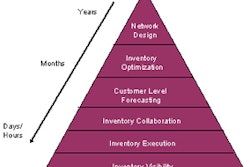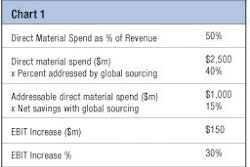Watertown, MA — December 14, 2006 — Making an enterprise resource planning (ERP) purchasing decision can be a daunting task for any business. Yet when implemented correctly and in line with your business goals, ERP can positively impact a company's bottom line, which is music to any chief financial officer's ears.
It is therefore imperative that CFOs are aware of the following 10 telltale signs that indicate whether their company needs to implement ERP for the first time or upgrade their current ERP solution to ensure profitable growth.
1. Customer satisfaction is low — Customers are a business' greatest asset. It is therefore essential that manufacturers are able to provide good customer service by accurately fulfilling customer orders and meeting delivery dates on time, every time. ERP allows the customer service department to communicate effectively with production and shipping, giving the rest of the business visibility from the customer service perspective, leading to delighted customers that keep coming back.
2. Eroding margins — When a business' accounts receivable are on the rise, so are its cash flow problems. Particularly in the engineered-to-order (ETO) industry, many companies operate with low-quantity/high-cost products, making timely payments a priority. An ERP solution tracks payment dates and amount of money due to a business so that the organization can appropriately plan and scale their operations based on cash flow.
3. Departments are becoming a cost center — Channeling information among departments seamlessly and efficiently is critical to a business' performance. Duplication of work and missed sales opportunities are just a couple of the costs businesses incur when information is not conveyed accurately and on time. ERP establishes an automated process that provides an overarching perspective of business operations so that departments are able to run leanly.
4. Production leads are slowed — When information from your sales department is not integrated with your engineering and production teams, customer orders cannot be met in a timely manner. This can lead to a loss of sales to competitors who are better equipped to scale their business to meet customer demand.
5. Business benefits are not being realized — Look back at the reasons behind implementing your company's ERP solution. Now look at how the solution is running today. Is it delivering the value to your business that you expected? If the answer is no, then it's time to reassess the solution and find out why. Has your business changed, but your ERP solution wasn't flexible enough to change as well? Was it just not the right choice?
6. Existing technology does not support growth — As a business changes and evolves, so must its ERP solution. If your existing solution is not able to keep up with the business' growth, including the demand from additional employees and managing increased orders and customer inquiries, it is merely a drain on your financial and human resources. This is a clear indication that your current solution requires an overhaul.
7. Antiquated reporting structures — It is critical that CFOs adhere to Sarbanes-Oxley regulations. With many legacy systems, or a lack of ERP technology altogether, audit and control processes are not integrated in a company's accounting system. In order to be compliant, a current ERP solution is necessary to ensure regulated financial reporting.
8. Carrying costs increase — The inability to accurately forecast demand is a major cost for businesses. By over-procuring supplies, businesses lose money from unused product and ongoing storage costs. Conversely, not ordering adequate supplies results in revenue loss as companies cannot meet increases in customer demand. ERP offers integration support for all functions of a business, including those critical to carrying costs such as inventory, order entry, production and shipping.
9. Inefficiency in sales — ERP allows companies to maintain accurate records of activities such as warehouse orders, customer inquiries and service calls, which are integral to a business running smoothly and leanly. Additionally, it provides organizations with a more accurate quoting process since the sales and engineering departments have easy access to information about past customer orders, allowing employees to avoid designing past custom orders and compiling pricing quotes from scratch. Without a 360-degree view across all departments, cost inefficiencies arise whereby departments are submitting duplicate requests for services or orders, ultimately wasting valuable time and human resources.
10. Increasing IT spend with decreasing IT performance — Merely having an ERP solution does not guarantee it is saving your business time and money. ERP is meant to solve business problems, not cause them. So when a business' IT department is constantly making one-off customizations to the current system, performance across all departments can subsequently decrease due to increased complexity that does not allow the system to run seamlessly across the business.
It is therefore imperative that CFOs are aware of the following 10 telltale signs that indicate whether their company needs to implement ERP for the first time or upgrade their current ERP solution to ensure profitable growth.
1. Customer satisfaction is low — Customers are a business' greatest asset. It is therefore essential that manufacturers are able to provide good customer service by accurately fulfilling customer orders and meeting delivery dates on time, every time. ERP allows the customer service department to communicate effectively with production and shipping, giving the rest of the business visibility from the customer service perspective, leading to delighted customers that keep coming back.
2. Eroding margins — When a business' accounts receivable are on the rise, so are its cash flow problems. Particularly in the engineered-to-order (ETO) industry, many companies operate with low-quantity/high-cost products, making timely payments a priority. An ERP solution tracks payment dates and amount of money due to a business so that the organization can appropriately plan and scale their operations based on cash flow.
3. Departments are becoming a cost center — Channeling information among departments seamlessly and efficiently is critical to a business' performance. Duplication of work and missed sales opportunities are just a couple of the costs businesses incur when information is not conveyed accurately and on time. ERP establishes an automated process that provides an overarching perspective of business operations so that departments are able to run leanly.
4. Production leads are slowed — When information from your sales department is not integrated with your engineering and production teams, customer orders cannot be met in a timely manner. This can lead to a loss of sales to competitors who are better equipped to scale their business to meet customer demand.
5. Business benefits are not being realized — Look back at the reasons behind implementing your company's ERP solution. Now look at how the solution is running today. Is it delivering the value to your business that you expected? If the answer is no, then it's time to reassess the solution and find out why. Has your business changed, but your ERP solution wasn't flexible enough to change as well? Was it just not the right choice?
6. Existing technology does not support growth — As a business changes and evolves, so must its ERP solution. If your existing solution is not able to keep up with the business' growth, including the demand from additional employees and managing increased orders and customer inquiries, it is merely a drain on your financial and human resources. This is a clear indication that your current solution requires an overhaul.
7. Antiquated reporting structures — It is critical that CFOs adhere to Sarbanes-Oxley regulations. With many legacy systems, or a lack of ERP technology altogether, audit and control processes are not integrated in a company's accounting system. In order to be compliant, a current ERP solution is necessary to ensure regulated financial reporting.
8. Carrying costs increase — The inability to accurately forecast demand is a major cost for businesses. By over-procuring supplies, businesses lose money from unused product and ongoing storage costs. Conversely, not ordering adequate supplies results in revenue loss as companies cannot meet increases in customer demand. ERP offers integration support for all functions of a business, including those critical to carrying costs such as inventory, order entry, production and shipping.
9. Inefficiency in sales — ERP allows companies to maintain accurate records of activities such as warehouse orders, customer inquiries and service calls, which are integral to a business running smoothly and leanly. Additionally, it provides organizations with a more accurate quoting process since the sales and engineering departments have easy access to information about past customer orders, allowing employees to avoid designing past custom orders and compiling pricing quotes from scratch. Without a 360-degree view across all departments, cost inefficiencies arise whereby departments are submitting duplicate requests for services or orders, ultimately wasting valuable time and human resources.
10. Increasing IT spend with decreasing IT performance — Merely having an ERP solution does not guarantee it is saving your business time and money. ERP is meant to solve business problems, not cause them. So when a business' IT department is constantly making one-off customizations to the current system, performance across all departments can subsequently decrease due to increased complexity that does not allow the system to run seamlessly across the business.








